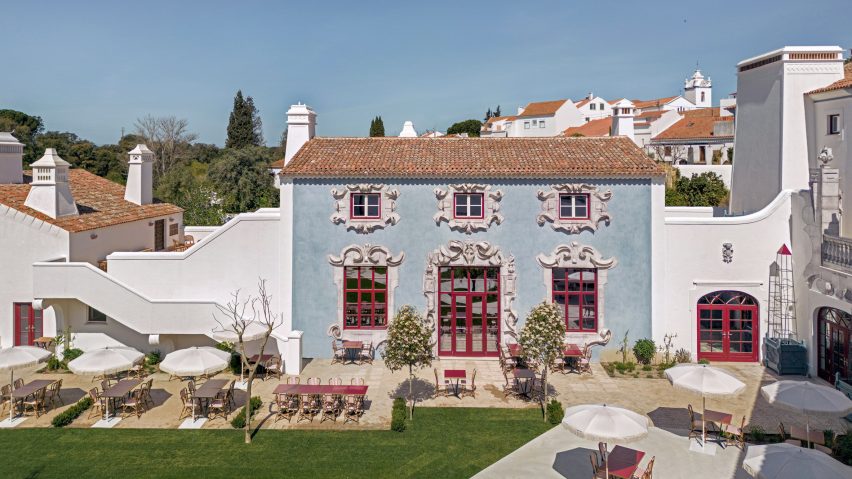Fashion designer Christian Louboutin and architect Madalena Caiado's 13-room boutique hotel in the village of Melides, south of Lisbon, celebrates craftsmanship and has been "designed at the scale of the hand".
Named after the French designer's signature colour, Vermelho, which is Portuguese for red, is Louboutin's first hospitality project.
The hotel features 13 rooms – all of them filled with the work of local craftsmen and a selection of materials and furniture from Louboutin's personal collection.
"This project has allowed me to empty my storage full of antiques and objects I have purchased over many years!" Louboutin told Dezeen.
At one point in the development of the project it looked like it might not be approved to operate as a hotel and so Louboutin decided "if it's not going to be a hotel, I'm going to do it as my house". As a result, each of the hotel's rooms have been individually designed and have their own identity.
"If you build a house, you're never going to design the same room," the designer said. "I don't know a house where you have the same room three times – it only exist in hotels."
"Houses have feelings – they have different rules to hotels," he continued. "You can't have your house looking like a hotel."
Vermelho was designed to be "well-integrated into the village" and it was important to Louboutin "that it really respects the area and environment".
Working with Portuguese architect Caiado, the resulting hotel meets the street as a series of traditional buildings in the local architectural language: white render with blue plinth and window detailing, terracotta-tiled roofs and a scattering of chimneys punctuating the skyline.
"We have tried to imagine a building that could have existed in that place, and that was part of the landscape," Caiado told Dezeen.
"To achieve that, we made a project adapted to the topography, relating to the surrounding buildings, and re-discovering traditional construction systems and materials."
The site, which curves round a private garden and swimming pool that looks out to reed marshes, culminates in a tower, punctuated with playful window openings that hint at the internal character of the project.
Discreet from the street, the interior design and garden-facing facade is full of detail, colour and craftmanship.
The hotel's maximalist and eclectic style was intended as a reflection of Louboutin's personal taste, while also celebrating Portuguese savoir-faire and the traditions of local craftspeople.
Having already worked with Caiado on his Lisbon house, Louboutin's brief for Vermelho was to show Caiado an Indian bracelet from his collection, which from the outside looks like a simple gold bangle, but on its inside face was engraved with busy animal designs and set with diamonds.
"I said to Madalena, the hotel should be like the bangle; from the outside, you don't see anything," Louboutin explained. "It's to be a very simple, well-designed building that doesn't give away much information about the inside,"
"But when you go inside, it should be this animal and diamond thing," he continued.
To achieve the highly decorative and detailed interior Louboutin collaborated with designer Carolina Irving, who acted as an advisor on textile creation and decoration, and ceramic tile designer and interiors consultant Patricia Medina.
Hand-painted frescoes by Greek artist Konstantin Kakanias cover the walls, while bedrooms features wardrobes with Maison Gatti French latticework.
Bespoke woodwork and carpentry was completed by Spanish master craftsmen company Los Tres Juanes. Throughout the project Louboutin used Alentejo tiles, as well as giving the Italian artist Giuseppe Ducrot a blank slate to design sculptural ceramic details for the facade.
The hotel restaurant, called Xtian, features a Klove Studio mural chandelier and a bespoke bar covered in hammered silver leaf, which was made by Seville-based liturgical goldsmiths Orfebrería Villarreal.
Speaking to Dezeen, Caiado described the project as "at the same time, the most extravagant and most traditional project I've ever done".
"The biggest challenge was balancing the different constellations of ideas for each space, so that it results in a harmonious way," she explained.
"Especially during construction, Christian was present and brought his own creative universe, but also a more tactile way of thinking and with an artistic component of searching for novelty, even when it came to traditional materials and techniques – almost as if the hotel was designed at the scale of the hand of those who built it."
Other recent boutique hotels featured on Dezeen include Dorothée Meilichzon's revamp of Cowley Manor Experimental and Beata Heuman's interiors for Hôtel de la Boétie in Paris.
Photography is by Ambroise Tézenas.

